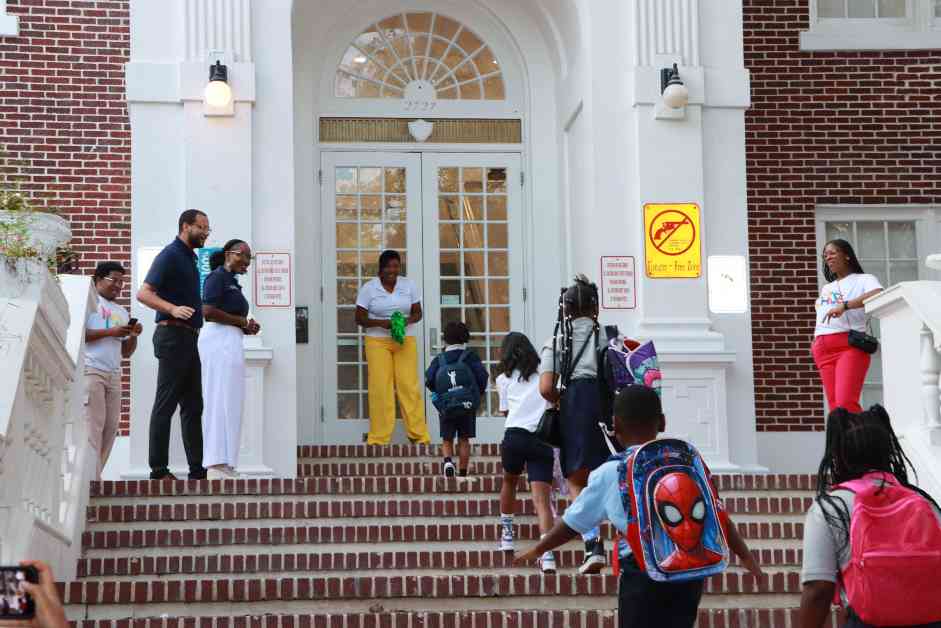In a significant development for the New Orleans education system, the city has reopened its first traditional school in 20 years. The Leah Chase School, named after the renowned New Orleans cultural and civil rights icon, has welcomed over 300 students for the current school year. This marks a notable departure from the city’s recent history, which saw it operating solely with charter schools since Hurricane Katrina ravaged the area nearly two decades ago.
The decision to establish the Leah Chase School comes after years of the New Orleans school district primarily relying on independently run charter schools. While charter schools receive public funding, they operate autonomously, leading to a landscape where traditional neighborhood schools have become increasingly rare. The opening of the Leah Chase School symbolizes a shift towards stability in a district that has been predominantly managed by charter organizations for the past five years.
NOLA Public Schools, the official name of the district, serves approximately 41,600 students, with a majority of them being Black. The move to introduce a district-run traditional school reflects changing attitudes within the community and the Orleans Parish School Board, which had previously favored a charter-only approach. The success of the Leah Chase School is expected to set a precedent for future school management decisions and could influence the direction of education policies in the city.
According to J. Celeste Lay, a political science professor at Tulane University specializing in education policy, the opening of the Leah Chase School signifies a shift towards a new era in New Orleans public education. Lay notes that the district appears more willing to consider direct management of schools, a departure from the post-Katrina era dominated by charter schools.
The establishment of the Leah Chase School was prompted by discussions that began in January following a board meeting regarding the future of Lafayette Academy, a charter school in the Uptown neighborhood. Superintendent Avis Williams recommended revoking Lafayette Academy’s charter due to poor performance, sparking deliberations on the school’s fate. When no alternative charter group stepped in to take over the school, the decision was made to close Lafayette Academy, prompting the need for a replacement.
The Orleans Parish School Board unanimously voted in favor of directly operating the Leah Chase School, marking a significant departure from the charter-only approach that had been prevalent in the district. The decision was influenced by community feedback and a growing sentiment that traditional neighborhood schools should be part of the educational landscape in New Orleans.
The swift establishment of the Leah Chase School within a short timeframe reflects a broader desire within the community to have a mix of traditional and charter schools. The school’s successful opening, with a full staff, principal, and enrollment exceeding 300 students, indicates a positive start to this new chapter in New Orleans education.
As the Leah Chase School begins its inaugural year, district leaders are already looking ahead to future plans for traditional public schools. The school’s performance and reception within the community will likely shape the district’s approach to managing schools moving forward. With an emphasis on stability and inclusivity, the Leah Chase School serves as a model for potential expansion of traditional schools in the district.
Subheadings:
The Shift Towards Traditional Education
Challenges and Opportunities
The Future of Education in New Orleans
In recent years, the New Orleans education system has undergone significant transformations, with a shift towards traditional education models gaining traction. The reopening of the Leah Chase School represents a departure from the charter-dominated landscape that has characterized the city’s educational system since Hurricane Katrina. This shift towards traditional schools presents both challenges and opportunities for the district as it navigates a new era in education.
The reintroduction of traditional schools in New Orleans comes at a critical juncture for the district, with stakeholders eager to explore alternative approaches to education. The Leah Chase School’s success in its early stages serves as a promising indicator of the potential for traditional schools to coexist alongside charter institutions. As the district continues to evolve, the future of education in New Orleans holds both challenges and opportunities for students, educators, and community members.
The Future of Education in New Orleans
Looking ahead, the future of education in New Orleans is poised for further evolution as the district explores a hybrid model of traditional and charter schools. The establishment of the Leah Chase School marks a significant milestone in this journey towards a more diverse educational landscape. By embracing a mix of school models, the district aims to provide students with a range of options tailored to their needs and preferences.
The development of traditional schools alongside charter institutions reflects a broader commitment to inclusivity and accessibility in education. As the district continues to adapt and grow, stakeholders are optimistic about the potential for a more balanced and comprehensive approach to schooling in New Orleans. With a focus on stability and community engagement, the future of education in the city holds promise for students and families seeking quality educational opportunities.

